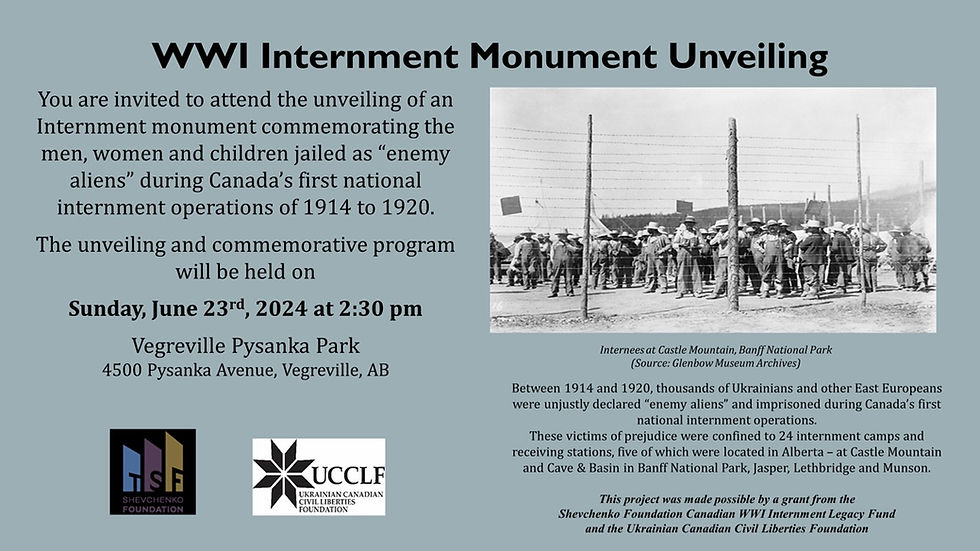"Ukrainian ambassador bestows honour, unveils sculpture in Kingston,” The Whig Standard, Dec 7, 2019
- Dec 8, 2019
- 3 min read
Kingston, Ontario — Andriy Shevchenko, the Ukrainian ambassador to Canada, honoured a local man and unveiled a piece of art celebrating the Kingston Ukrainian community in Kingston on Friday. Lubomyr Luciuk, 66, a professor of political geography in the department of political science and economics at Royal Military College, received the Cross of Ivan Mazepa, a state award of Ukraine, at a reception Friday evening at the River Mill Restaurant. The presidential award is given out to citizens or non-citizens of Ukraine for significant contributions to the revival of national interests such as cultural, artistic, spiritual, architectural, military and historical heritage, among other contributions. Luciuk, who was born in Kingston, is the 103rd recipient of the medal since it was first awarded in 2009. “It’s a high honour,” Luciuk said in an interview. “It was unexpected. I had no idea it was coming. I was quite taken aback and pleasantly surprised.“It’s meant to recognize people who made outstanding contributions to promoting the Ukrainian cause generally.”
Mazepa (1639-1709) was a Ukrainian political statesman and military leader. He was also head of the Cossack State in Left-bank Ukraine. He fought for the independence of Ukraine and in the late 17th century and early 18th century led a revolt against Moscow. “The cross being named after him really recognizes people who contribute to the ongoing struggle to preserve Ukraine’s independence, whether articulated or defended,” Luciuk said. “This was a serious individual who recognized that Ukraine had to fight for its freedom.” Luciuk has also defended Ukraine’s right to freedom and independence through the years through his many books, newspaper commentaries and public appearances on the subject. He’s also organized dozens of projects across Canada and overseas focused on the political geography of Ukraine in the 20th and 21st centuries. Luciuk has been behind such projects as securing funding in 2017 for a memorial walk at Loos-en-Gohelle, France, honouring Cpl. Filip Konowal, a Ukrainian Canadian soldier of the First World War whose valour at the Battle of Hill 70 earned him a Victoria Cross. Luciuk also oversaw the unveiling of the world’s first English, Ukrainian, Hebrew and Yiddish plaque in New York City, in 2018. He also worked to secure official acknowledgement and symbolic redress for Canada’s first national internment operations of 1914 to 1920, leading to the creation of the Canadian First World War Internment Recognition Fund, which supports dozens of educational, cultural and commemorative projects across Canada, including a permanent exhibit within Fort Henry.
He’s also written 31 books on Ukrainian history and its people’s plight. “I was born in Kingston, my parents were political refugees, so they inspired me and my sister (Nadia) and many others to never forget where we came from,” Luciuk said. He said Ukrainians came to Kingston to enjoy the freedom that Canadians enjoy and set up roots in the Limestone City. “The Ukrainians who came here, whether they were economic migrants or political refugees, were struggling to achieve the same thing for Ukraine,” he said.
The country has been independent since 1991 but is still fighting against Russia to protect its independence. “One of my life’s works has been to make sure that books about Ukraine are available,” he said. Luciuk helped publish accounts of Ukrainians who survived the Holocaust, the famine and other struggles they faced. “I’ve had lots of support, lots of friends and colleagues that have worked, everyone from my sister and my daughter Kassandra to the people I’ve worked with (from) the Ukrainian-Canadian Civil Liberties Association and others too many to mention,” he said. “I wouldn’t be who I am if it hadn’t been who my parents were.”
On Friday at 4:30 p.m. in City Hall, Shevchenko revealed the sculpture Enduring Roots, created by artist Nick Leniuk of Peterborough. The sculpture depicts an oak tree and its roots spreading in the ground. “The sculpture shows strong and mutually supportive roots sustaining a tall and growing tree whose branches spread all about and above, recalling how the Ukrainians who began immigrating to Kingston over a century ago were nourished by their Christian faith (symbolized by the stylized Ukrainian cross), by their cultural and political heritage, and through their commitment and loyalty to this country,” Luciuk said. “Whether they arrived in Kingston as economic migrants, or found asylum here as political refugees, they all made Canada their ‘home and native land’ and this city their own.” Carved in stone, the sculpture is mounted on an oak base, surrounded by a carved wooden frame. The sculpture was commissioned by the Ukrainian Canadian Club of Kingston to mark the 50th anniversary of the Lviv, Ukraine, pavilion at Folklore and the 50th anniversary of the Ukrainian Maky Dance Ensemble while underscoring how a small Ukrainian Canadian community has existed in Kingston for well over 100 years. “Overall, this sculpture speaks to our community’s endurance and to its strong and healthy roots while recalling the many different paths our people took to come to Kingston and make this city our home.”




Comments